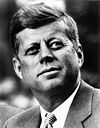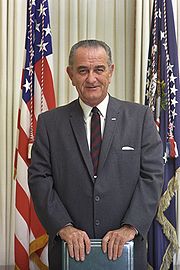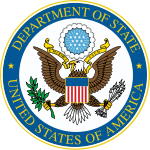Dean Rusk
| Dean Rusk | |
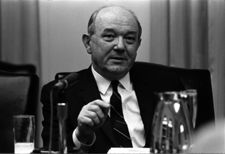 |
|
|
|
|
|---|---|
| In office January 21, 1961 – January 20, 1969 |
|
| President | John F. Kennedy Lyndon B. Johnson |
| Preceded by | Christian Herter |
| Succeeded by | William P. Rogers |
|
1st Assistant Secretary of State for International Organization Affairs
|
|
| In office February 8, 1949 – May 26, 1949 |
|
| President | Harry S. Truman |
| Preceded by | Post created |
| Succeeded by | John D. Hickerson |
|
|
|
| Born | February 9, 1909 Cherokee County, Georgia |
| Died | December 20, 1994 (aged 85) Athens, Georgia[1] |
| Political party | Democratic |
| Alma mater | Davidson College Oxford University University of California-Berkeley |
| Profession | Professor, Soldier, Politician |
| Religion | Presbyterian |
| Signature | |
| Military service | |
| Service/branch | United States Army |
| Rank | Colonel |
| Battles/wars | World War II |
| Awards | Legion of Merit |
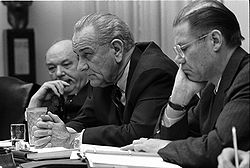
David Dean Rusk (February 9, 1909 – December 20, 1994) was the United States Secretary of State from 1961 to 1969 under presidents John F. Kennedy and Lyndon B. Johnson. Along with James Madison, this makes him the second-longest serving US Secretary of State of all time, behind Cordell Hull.
Contents |
Childhood and education
Dean Rusk was born in a rural district[2] of Cherokee County, Georgia, the son of Robert Hugh and Frances Elizabeth (Clotfelter) Rusk.[3] He was educated in Atlanta's public schools, graduated from Boys High School in 1925,[4] and spent two years working for an Atlanta lawyer before working his way through Davidson College. Rusk was coached in football by William "Monk" Younger and was a member of the Kappa Alpha Order Sigma chapter,[5] becoming a Cadet Lieutenant Colonel commanding the Reserve Officers' Training Corps battalion. He graduated Phi Beta Kappa in 1931.[4] While studying in England as a Rhodes Scholar at St. John's College, Oxford, he received the Cecil Peace Prize in 1933.[4][6]
From 1934 to 1940 Rusk taught at Mills College in Oakland, California, and earned a law degree at the University of California, Berkeley in 1940. He married Virginia Foisie (October 5, 1915 – February 24, 1996) on June 9, 1937[4] and they had three children.[7]
Career prior to 1961
In World War II he joined the infantry as a reserve captain, and served as a staff officer in the China Burma India Theater. At war's end he was a colonel, decorated with the Legion of Merit with Oak Leaf Cluster.[4]
He returned to America to work briefly for the War Department in Washington. He joined the Department of State in February 1945 working for the office of United Nations Affairs. In the same year, he suggested splitting Korea into a sphere of U.S. and one of Soviet influence at the 38th parallel north. He was made Deputy Under Secretary of State in 1949. He was made Assistant Secretary of State for Far Eastern Affairs in 1950 and played an influential part in the US decision to become involved in the Korean War, and also Japan's postwar compensation for victorious countries, such as the Rusk documents. However he was a cautious diplomat and always sought international support.
Rusk was a Rockefeller Foundation trustee from 1950 to 1961. In 1952 he succeeded Chester L. Barnard as president of the Foundation.[4]
Secretary of State
On December 12, 1960, Democratic President-elect John F. Kennedy appointed Rusk Secretary of State. According to historian and former Special Assistant to President Kennedy Arthur Schlesinger, Jr. Rusk was not Kennedy's first choice, but rather the "lowest common denominator", as Kennedy's first choice, William Fulbright, proved too controversial.[8] Rusk was sworn in January, 1961.[4]
As Secretary of State he believed in the use of military action to combat Communism. Despite private misgivings about the Bay of Pigs invasion, he remained noncommittal during the Executive Council meetings leading up to the attack and never opposed it outright. During the Cuban missile crisis he supported diplomatic efforts. Early in his tenure, he had strong doubts about US intervention in Vietnam,[9] but later his vigorous public defense of US actions in the Vietnam War made him a frequent target of anti-war protests. Outside of his work against communism, he continued his Rockefeller Foundation ideas of aid to developing nations and also supported low tariffs to encourage world trade. Rusk also drew the ire of supporters of Israel after he let it be known that he believed the USS Liberty incident was a deliberate attack on the ship, rather than an accident.
As he recalled in his autobiography, As I Saw It, Rusk did not have a good relationship with President Kennedy. The president was often irritated by Rusk's reticience in advisory sessions and felt that the State Department was "like a bowl of jelly" and that it "never comes up with any new ideas." Special Consul to the President Ted Sorensen believed that Kennedy, being well versed and practiced in foreign affairs, acted as his own Secretary of State. Sorensen also noted that the president often expressed impatience with Rusk and felt him under prepared for emergency meetings and crises.[10] Rusk repeatedly offered his resignation, but it was never accepted. Rumors of Rusk's dismissal leading up to the 1964 election abounded prior to President Kennedy's trip to Dallas in 1963. Shortly after Kennedy was assassinated, Rusk offered his resignation to the new president, Lyndon B. Johnson. However, Johnson refused Rusk's resignation and retained him as the Secretary of State throughout his administration.
Rusk also planned to offer his resignation in the summer of 1967 because "his daughter planned to marry a black classmate at Stanford University, and he could not impose such a political burden on the president." He decided not to resign after talking first to Robert S. McNamara and Lyndon Johnson.[11]
When Johnson died in 1973, Rusk eulogized the former President when he lay in state.
After President of France Charles de Gaulle withdrew France from the common NATO military command in February 1966 and ordered all American military forces to leave France, President Johnson asked Rusk to seek further clarification from President de Gaulle by asking whether the bodies of buried American soldiers must leave France as well.[12] Rusk recorded in his autobiography that de Gaulle did not respond when asked, "Does your order include the bodies of American soldiers in France's cemeteries?"[13][14]
Rusk again offered to resign in 1967, after it became known that his daughter, Peggy, planned to marry Guy Smith,[15] "a black Georgetown grad working at NASA. (Johnson didn't accept it.)"[16] In fact, the Richmond News Leader stated that it found the wedding offensive, further saying that "anything which diminishes [Rusk's] personal acceptability is an affair of state".[1] A year after his daughter's wedding, Rusk was invited to join the faculty of the University of Georgia Law School, only to have his appointment denounced by Roy Harris, an ally of Governor George Wallace and a member of the university's board of regents, who stated that his opposition was because of Peggy Rusk's interracial marriage. The university nonetheless appointed Rusk to the position.[15]
Retirement
Rusk received both the Sylvanus Thayer Award and the Presidential Medal of Freedom in 1969.
Following his retirement, he taught international law at the University of Georgia School of Law in Athens, Georgia (1970–1984). He died in Athens on December 20, 1994. He and his wife are buried at Oconee Hill Cemetery, Athens, Clark County, Georgia.
Rusk Eating House, the first women’s eating house at Davidson College, was founded in 1977 and is named in his honor. The Dean Rusk International Studies Program at Davidson College is also named in his honor.
Dean Rusk Middle School, located in Canton, Georgia, was named in his honor, as was Dean Rusk Hall on the campus of the University of Georgia.
See also
- Rusk documents
References
- ↑ New York Times,Dec 22, 1994,pg. A1
- ↑ MORRISON, DONALD (1990-07-30). "Ghost Dad (bk rvw of AS I SAW IT by Dean Rusk, as told to Richard Rusk)". Time. http://www.time.com/time/magazine/article/0,9171,970754,00.html. Retrieved 2008-02-04. ""I won't be around for history's verdict," says Rusk, now 81 and ailing in his Georgia retirement, "and I am perfectly relaxed about it.""
- ↑ Page 425 of Congressional Directory,89th Congress, Second Session, January 1966
- ↑ 4.0 4.1 4.2 4.3 4.4 4.5 4.6 Anonoymous. "Biography of Dean Rusk". Davidson College. http://www3.davidson.edu/cms/x10615.xml. Retrieved 2008-02-03.
- ↑ "Famed Fraternity Members". Kappa Alpha Order. http://www.kappaalphaorder.org/repository/unmanaged_content/joinka/fame.html. Retrieved 2008-02-03.
- ↑ Turner, Arthur Campbell; Francis Carney and Jan Erickson (2005-04-05). [http://www.ucrhistory.ucr.edu/pdf/turner2.pdf "Transcription of Oral History Audio Interview with ARTHUR CAMPBELL TURNER April 6 and May 28, 1998"] (PDF). University of California, Riverside. pp. 8. http://www.ucrhistory.ucr.edu/pdf/turner2.pdf. Retrieved 2008-02-03.
- ↑ "Parks Rusk Collection of Dean Rusk Papers". Richard B. Russell Library for Political Research and Studies. University of Georgia. pp. Biographical Note. http://www.libs.uga.edu/russell/collections/ruskparks/index.shtml. Retrieved 2008-02-04.
- ↑ Schlesinger, Jr., Arthur M. (2008). Journals 1952-2000. Penguin Books. p. 98. ISBN 978-0-14-311435-2. "Elizabeth Farmer told me this evening that, at five this afternoon, it looked as if it would be Rusk in State, with Bowles and Bundy as Undersecretaries. (Ken, by the way, told me that Jack had called him on the 7th and talked seriously about Mac as Secretary.) I asked why Rusk had finally emerged. Elizabeth said, "He was the lowest common denominator." Apparently Harris Wofford succeeded in stirring the Negroes and Jews up so effectively that the uproar killed Fulbright, who was apparently Jack's first choice."
- ↑ Henry II, John B.; William Espinosa (Autumn, 1972). "The Tragedy of Dean Rusk" (fee). Foreign Policy, No. 8, (Carnegie Endowment for International Peace): pp. 166–189. doi:10.2307/1147824. http://links.jstor.org/sici?sici=0015-7228(197223)8%3C166%3ATTODR%3E2.0.CO%3B2-S. Retrieved 2008-02-04.
- ↑ Sorensen, Ted (2008). Counselor: A Life At The Edge Of History. HarperCollins. pp. 233–234. ISBN 978-0-06-079871-0. "President Kennedy was less satisfied with his secretary of state, Dean Rusk...John F. Kennedy, more than any president since FDR, was his own secretary of state...But it was not the White House staff that said the State Department was "like a bowl of jelly," or that it "never comes up with any new ideas." Those were John F. Kennedy's words...More than one White House tape revealed the president's impatience with Rusk...nor did JFK or RFK believe that Rusk himself was as thoroughly prepared for emergency meetings and crises as he should have been."
- ↑ McNamara, Robert S. (1995). In Retrospect: The Tragedy and Lessons of Vietnam. Random House. p. 282. ISBN 0-8129-2523-8. "It may be hard for readers today to understand what went through his mind. But it was very clear to me at the time: he believed that because he was a southerner, working for a southern president, such a marriage--if he did not resign or stop it--would bring down immense criticism on both him and the president. .... [T]he president reacted as I expected--with congratulations for the impending marriage. So far as I was aware, the marriage had absolutely no effect--political or personal--on Dean or the president."
- ↑ Ogden, Christopher (1995-09-18). "BOMBS AWAY!". TIME Magazine Volume 146, No. 12: pp. 166–189. http://www.time.com/time/international/1995/950918/cover.washington.html. Retrieved 2009-02-11.
- ↑ "Andrew Roberts addresses The Bruges Group". The Bruges Group. http://www.brugesgroup.com/events/index.live?article=13490. Retrieved 2009-02-11.
- ↑ Schoenbaum, Thomas J. (1988). Waging Peace and War: Dean Rusk in the Truman, Kennedy, and Johnson Years. Ann Arbor, Michigan: Simon and Schuster. p. 421. ISBN 0671603515.
- ↑ 15.0 15.1 Romano, Renée Christine (2003). Race Mixing. Harvard University Press. pp. 204–205.
- ↑ Rick, Frank (November 2, 2006). "Guess Who's Coming to Dinner". The New York Times: p. W-10.
- Rusk, Dean (1963). The winds of freedom; selections from the speeches and statements of Secretary of State Dean Rusk, January 1961- August 1962. Boston: Beacon Press. OCLC 1106835.
- Rusk, Dean (1990). Rusk, Richard; Papp, Daniel S.. eds. As I Saw It. New York: W. W. Norton & Company. ISBN 0393026507.
External links
- Interview for WGBH series, War and Peace in the Nuclear Age
- "Dean Rusk". Find a Grave. http://www.findagrave.com/cgi-bin/fg.cgi?page=gr&GRid=9821. Retrieved 2008-02-05.
- Oral History Interviews with Dean Rusk, from the Lyndon Baines Johnson Library
| Government offices | ||
|---|---|---|
| Preceded by New Office |
Assistant Secretary of State for International Organization Affairs February 8, 1949 – May 26, 1949 |
Succeeded by John D. Hickerson |
| Preceded by William Walton Butterworth |
Assistant Secretary of State for Far Eastern Affairs March 28, 1950 – December 9, 1951 |
Succeeded by John Moore Allison |
| Political offices | ||
| Preceded by Christian Herter |
United States Secretary of State Served under: John F. Kennedy, Lyndon B. Johnson 1961–1969 |
Succeeded by William P. Rogers |
| Awards | ||
| Preceded by Bob Hope |
Sylvanus Thayer Award recipient 1969 |
Succeeded by Ellsworth Bunker |
|
|||||||||||||||||||||||||||||||||||||
|
|||||||||||||||||||||||||||||||||||||||||||
|
||||||||||
|
|||||||
